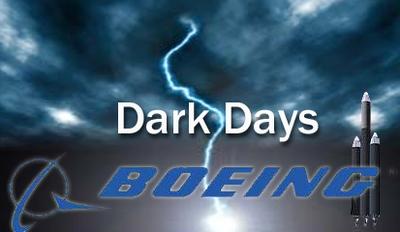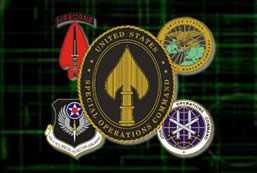Special Operations Command, Veterans Association Under
Loupe
By Aero-News Senior Correspondent Kevin R.C. "Hognose"
O'Brien
Boeing is back in the news, and this time it's not for a record
year selling commercial aircraft or for the effectiveness of its
military products. The company stands accused -- again -- of
misconduct relating to military contracts.

According to a copyrighted story by Leslie Wayne in the New York
Times, military investigators are "looking into accusations... that
one former military procurement official who oversaw millions of
dollars in Boeing Company contracts went to work for Boeing after
leaving the [United States Special Operations] command."
Making the accusations is the US Special Operations Command
Inspector General's Office, which is conducting one of several
investigations into procurement wrongdoing at the command. The FBI,
the US Attorney in Tampa, and the Defense Criminal Investigation
Service are digging as well.
The United States Special Operations Command is a unique unified
command in the US military, in that it serves both as a
force-provider command that organizes, equips and trains forces for
special operations, and also as a combatant command that plans and
executes the operations. No other four-star command wears two hats
in this manner.
These new charges appear to result from, but not be directly
connected to, the bribery and kickback scandal centered on USSOCOM
purchasing official William E. Burke. Burke, a civilian procurement
officer at the command, pled guilty to accepting payments from a
contractors' representative in a bribery and kickback scheme, and
is cooperating with investigators.
If the judge maxes Burke out at his sentencing -- unlikely, if
his cooperation brings others to justice -- Burke could get 15
years in the Federal pen, and a quarter-million-dollar fine -- a
laughably small sum, given that he has admitted foul play in
millions and millions of dollars in contracts. He received a total
of $12,000 in kickbacks, but was promised more money as the
contracts were fulfilled.
 That isn't going to be happening
now. Indeed, he may want all fifteen years, if it turns out he took
money to send SEALs, Rangers and Special Forces into combat with
second-rate gear.
That isn't going to be happening
now. Indeed, he may want all fifteen years, if it turns out he took
money to send SEALs, Rangers and Special Forces into combat with
second-rate gear.
Burke was involved with the purchasing of items like body armor,
night vision devices, and small arms, not with big-ticket items
like aircraft. But investigators are looking at all of USSOCOM's $6
billion budget for signs of more wrongdoing.
So far, the others who participated in Burke's scheme have not
been charged, but both civilian and uniformed officials, as well as
industry figures, are under scrutiny. One officer fingered by the
Times as an investigation target is senior Special Operations
officer General Bryan D. "Doug" Brown.
Brown is the first 4-star commander of USSOCOM to have been
primarily an Army Aviator in his career. His past assignments
include command of Army special operations aviation elements at
several levels, although he's also headed the Special Forces
Command and commanded classified elements.
Also under investigation, according to the Times, is the Night
Stalkers Association and whether it was used to channel corporate
largesse to the benefit of United States Special Operations Command
senior officials. Boeing was one of many donors to the association,
which is the veterans' association of Army special operations
aviators. (Wayne's story didn't seem to quite grasp this
point).
The name "Night Stalkers" is the nickname of the 160th Special
Operations Aviation Regiment, who prefer to fly at night, and many
of the companies that make gear the active duty Night Stalkers
depend on -- such as the Boeing MH-47 helicopter, to name one
rather critical piece of 160th kit -- contribute generously to the
organization, support its functions, and help fund its
scholarships.
The Times says the Association, "provides entertainment and
parties for command officials." There's little about parties on the
Night Stalker Association website, although there is a list of 31
scholarships the association offers to survivors of the regiment's
fallen. The charges against the Night Stalkers Association appear,
on their face, unlikely.
For Boeing, this can only lead to a headache. There will be a
lot of rehashing of the Darleen A. Druyun scandal which landed
former Pentagon official and Boeing executive Druyun, and Boeing
CFO Michael M. Sears in the calaboose (Federal Inmates Number
47614-083 ['til 2009] and 70040-083 [released 7/05]
respectively).

So far that scandal looks much bigger than this new one. Druyun
steered Air Force contracts worth five times the entire USSOCOM
budget to Boeing; according to CBS, Boeing gave her daughter and
son-in-law jobs for a $4 billion C-130 upgrade contract, and the
price of Druyun's own job with the company was a $24 billion tanker
leasing deal (on which the DOD reneged when it found out the
contract was let unlawfully).
Exposure of the misconduct locked Boeing out of competition for
Federal contracts for months, cost CEO Phil Condit his job, and
brought back former CEO Harry Stonecipher. Even then, the
snakebitten company couldn't escape scandal. After making every
single one of Boeing's employees sign an ethics pledge, the
autocratic Stonecipher was caught advancing the career of a female
executive over thirty years his junior, with whom he was carrying
on a sexual relationship. Stonecipher had to follow Condit into
disgraceful (if extremely well-compensated) retirement.
Perhaps it was a portent of things to come when Stonecipher
moved the company's HQ from squeaky-clean Seattle to crime-family
Chicago, half a continent removed from most of Boeing's
manufacturing, during his first stint as CEO.
 Aero-TV: DeltaHawks Diesel Power Steps Into the Spotlight
Aero-TV: DeltaHawks Diesel Power Steps Into the Spotlight NTSB Prelim: Mooney Aircraft Corp. M20K
NTSB Prelim: Mooney Aircraft Corp. M20K ANN FAQ: Turn On Post Notifications
ANN FAQ: Turn On Post Notifications ANN's Daily Aero-Linx (12.20.25)
ANN's Daily Aero-Linx (12.20.25) Aero-News: Quote of the Day (12.20.25)
Aero-News: Quote of the Day (12.20.25)





